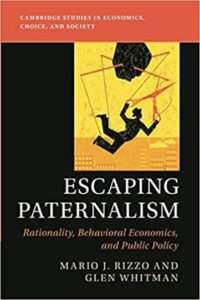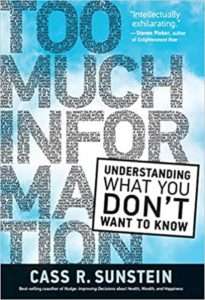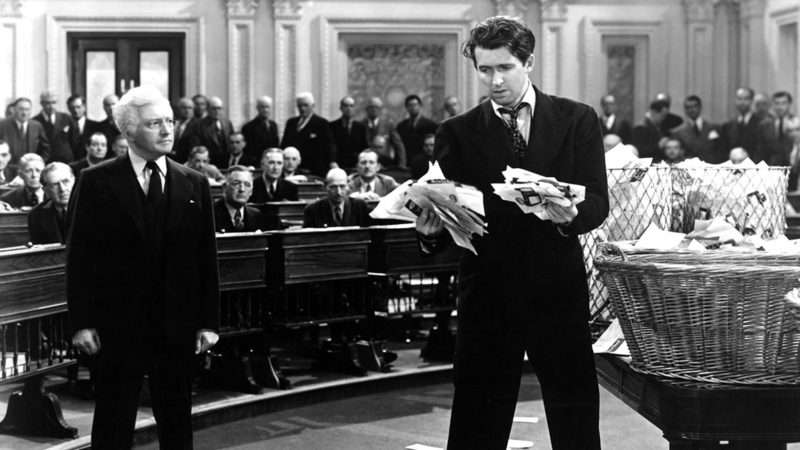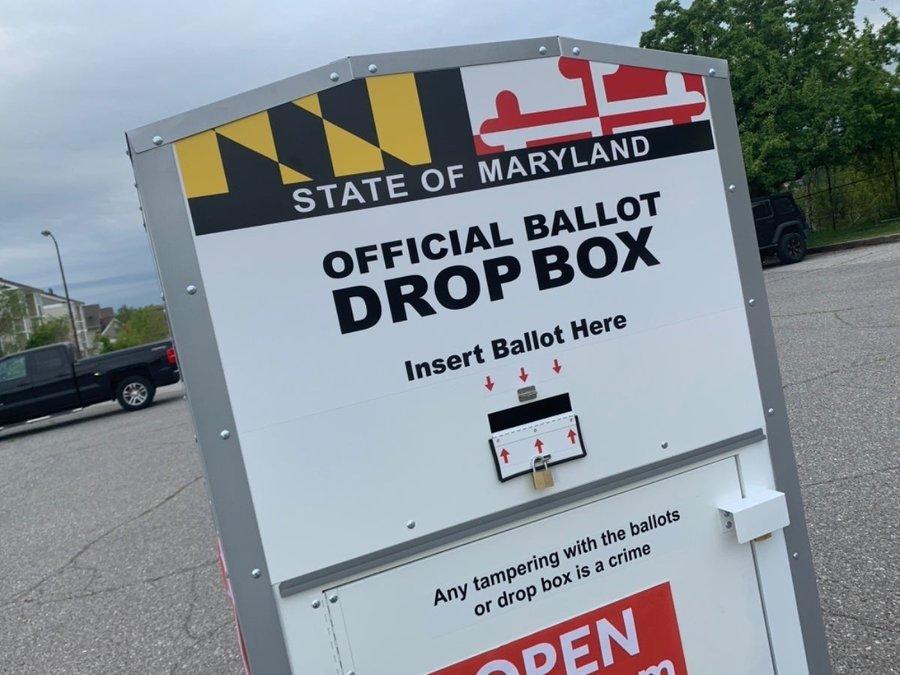

Traditional paternalists argue that they know what’s good for you regardless of your own preferences. Prohibition advocates, for example, claimed that people must be forced to stay away from “Demon Rum” no matter how much they like to drink, or how carefully they weigh the costs and benefits of doing so. Over the last twenty years, however, intellectually sophisticated paternalists have largely shifted to a different rationale for restricting freedom of choice: “libertarian paternalism.”
Unlike old-fashioned paternalists, advocates of LP argue that choice must sometimes be restricted in order to enable people to better pursue their own “true” preferences—to do what they themselves would want to do, but for the pernicious influence of ignorance and cognitive biases. LP enthusiasts also contend that policymakers can simultaneously improve decision-making and minimize coercion by using carefully calibrated “nudges” rather than the crude blunderbuss tactics of “hard” paternalists. For their part, critics claim that the behaviorial research underlying LP isn’t as robust as advocates assert, and that the new paternalistic policies have many of the same flaws as the old.
Two recently published books suggest that there may be more room for common ground between defenders and critics of LP than previously assumed. The first is Too Much Information: Understanding What You Don’t Want to Know by Harvard law professor Cass Sunstein, one of the leading advocates of LP. The second, Escaping Paternalism: Rationality, Behavioral Economics, and Public Policy, by economists Mario Rizzo and Glen Whitman (RW), perhaps the leading academic critics of LP. Sunstein and RW are longtime adversaries in the academic debate over paternalism. But these two books have so much in common that readers unfamiliar with the authors’ history might assume they are all on the same side.
I. Escaping Paternalism
Rizzo and Whitman’s book is by far the most thorough and insightful critique of “libertarian paternalism” published so far. The first half of the book criticizes paternalists’ arguments that individuals acting in the market and civil society are prone to systematic cognitive errors that justify policymakers in intervening to ensure that their actions better align with their “true” preferences. The second half assumes that these cognitive problems are real, but offers a wide-ranging critique of paternalistic claims that government regulators are likely to improve the situation rather than make it worse.
In the first part of their book, RW offer a helpful critique of the standard neoclassical economic conception of rationality (or at least more extreme versions thereof) underpinning many paternalist arguments. For example, they dispute the notion that it is necessarily irrational if a person lacks complete and consistent preferences that cover all possible choices that might come before her. In many cases, developing a complete set of preferences and ensuring that they are all consistent just isn’t worth the cost of doing so, in terms of time and effort.
Similarly, contrary to the assumptions of many scholars and others, there is nothing inherently irrational about “time discounting”—valuing present benefits more than similar future ones. People choose a dollar today over two dollars a year from now are not necessarily irrational, despite moral strictures to the contrary. Thus, we should be skeptical of claims that such preferences justify imposing forced savings of various kinds, as many paternalists argue.
Instead of what they criticize as a narrow “puppet” view of rational behavior, RW advocate a theory of “inclusive rationality,” which takes a much broader view of what qualifies as rational decision-making. Many supposedly irrational behaviors may actually be reasonable under the circumstances, or indications of “nonstandard” preferences. An obese person with an unhealthy diet could be irrational. But he might simply set a high value on eating his favorite foods and avoiding the discomfort of going on a diet—enough to outweigh the potential benefits of improving his health.
RW also summarize evidence indicating that many standard cognitive errors often cited as justification for paternalistic policies are overblown. For example, as the work of Charles Plott and Kathryn Zeiler indicates, the “endowment effect” (supposedly irrational preference for things you already own over assets of similar value that you might acquire in the future) is actually mostly a combination of flaws in experimental design and largely rational reasons for preferring the bird in hand over one in the bush, in some circumstances.
While there are many good points in the first half of the book, I agree with some of economist Bryan Caplan’s criticisms of it. As Caplan (who is otherwise highly sympathetic to RW) explains, their concept of “inclusive rationality” at times seems so broad that they seem unwilling to describe virtually any behavior as irrational. RW rightly point out that it can be difficult to separate out rational behavior from the irrational type, because “there is often no clear dividing line” between the two. But that doesn’t mean there are not at least some clear cases of the latter.
That said, even if the first half of Escaping Paternalism isn’t fully persuasive, it offers strong arguments that the cognitive defects identified by paternalists are greatly overstated.
The second half of the book is even stronger. Even if there are more cases of genuine irrationality than RW are willing to admit, it explains why paternalistic policies are likely to do more harm than good. In Chapter 7, RW explain how paternalistic policymakers often lack the relevant knowledge needed to make their interventions effective. For example, they routinely lack information on what people’s “true” preferences actually are, the size of the cognitive biases they seek to correct, and the way those biases vary in heterogenous populations. If, for example, only a subset of the population eats too much unhealthy food out of cognitive bias, while others engage in self-control or have true preferences that value eating their favorite foods over maximizing health, a tax on fatty foods that applies equally to everyone can easily do more harm than good, based on “libertarian” paternalists’ own criteria.
Advocates of the new paternalism often implicitly assume that policymakers are highly knowledgeable and free of bias. In reality, as RW explain, cognitive biases and ignorance are likely to be even more severe among both voters and politicians than among participants in private sector transactions. Voters have strong incentives to be “rationally ignorant” and to indulge partisan and ideological biases; the low likelihood of any individual vote changing the outcome of an election makes it rational for voters to make little effort to seek out information or correct biases. Politicians have similar biases, and of course must cater to ignorant and biased voters to win elections.
Proposals to get around these problems by empowering bureaucratic experts have flaws of their own. Experts are unlikely to be free of biases of their own. And they too have little incentive to carefully gauge their interventions to the “true” preferences of the public they are trying to help.
There is much more to RW’s book—so much so that I can’t possibly summarize more than a fraction of it in a review. Almost every page and chapter has valuable insights. I differ with the authors on some points, especially in the first half of the book. But if you only read one book on “libertarian paternalist” policies, this should be it.
II. Too Much Information
Cass Sunstein is one of the leading advocates of “libertarian paternalism,” and his earlier works come in for a lot of criticism in RW’s book. He is perhaps most famous for advocating “nudges” as a form of paternalistic policy less heavy-handed and coercive than traditional paternalism. One might therefore expect Sunstein to be particularly supportive of paternalistic policies that seek to influence behavior simply by requiring revelation of information. Such policies are usually considered less coercive and intrusive than direct mandates. For example, instead of banning or taxing unhealthy food, the government can mandate disclosure of calorie counts or potential risks associated with consuming too much food of a particular type.
Interestingly, however, Sunstein’s new book takes exactly the opposite tack from what one might expect. The first half outlines the many dangers of excessive information disclosure requirements intended to inform consumers of various potential risks. The second advocates a major rollback of mandated information-gathering for use by the government itself.
Disclosure of additional information may seem like an unalloyed good. Surely, having more knowledge is always better than less. But, as Sunstein points out, mandated disclosure has real costs. Sometimes, ignorance really is bliss.
Reading disclosures may take up time and effort that are better used elsewhere. In addition, people often actively dislike getting information that they find annoying or unpleasant. Looking at the calorie count for your hamburger may detract from your enjoyment of the meal, for example.
Such “hedonic taxes,” as Sunstein calls them, are especially serious for the many people who don’t change their behavior as a result of getting the information in question. You may like your favorite food so much, that you will continue to eat it in the same copious quantities regardless of the calorie count. Even when behavior does change in response to new information, Sunstein explains that it is still far from clear that the costs of disclosure outweigh the benefits.
In addition, mandated disclosure might actually divert attention away from other, more important information, and thus actually reduce the quality of consumer decision-making rather than improve it. Human attention is a scarce good, and regulators who divert it onto their preferred warnings might simultaneously be diverting it away from other, more important considerations.
In criticizing mandated disclosure laws, Sunstein often sounds a lot like Rizzo and Whitman. For example, he too emphasizes the importance of policymakers’ inability to discern “true” preferences, and the importance of heterogeneity of preferences. Both books also point out that private precautions (in this case private disclosure and information gathering) often obviate the need for paternalistic policies.
Sunstein does not advocate anything approaching complete abolition of mandatory disclosure laws. But he does suggest imposing tight limits on them, most notably by limiting them to disclosure of especially important information about potential risks. He also recognizes that, in many cases, we need much more evidence before we can assume that many currently popular mandatory disclosure laws are justified.
The second half of Too Much Information tackles the costs of mandated disclosure of information to the government. Every year, businesses, civil society organizations, and individuals fill out millions of pages of information forms to satisfy the demands of regulators, tax collectors, and other government agencies. Sunstein cites data indicating that federal-government paperwork alone imposes 9.78 billion hours of work on Americans every year. He estimates the economic costs of this burden as at least $200 billion per year, and possibly much higher.
In addition, having to do paperwork imposes significant psychological pain, as for most people it is one of the least-favorite ways of spending time. This point is backed by scientific research, but also by common sense. Just think of how much you enjoy filling out tax forms and other bureaucratic documents! In many instances, paperwork burdens deter people from socially valuable activities such starting new businesses. In that way, paperwork “sludge,” as Sunstein refers to it, harms society as a whole, not just those most directly affected.
As Sunstein recognizes, there may be instances where sludge is a feature rather than a bug, as when we might want to deter frivolous applications for various government benefits (in order to ensure those who apply are genuinely needy). Sunstein suggests the same may be true for certain transactions that we might want to prevent people from undertaking impulsively, such as getting married, having an abortion, acquiring a gun RW would probably argue that such policies rely on the dubious assumption that those who want to marry or get a gun quickly are acting on irrational impulses as opposed to appropriate concerns for their security, or justifiable enthusiasm for starting married life as fast as possible. For his part, Sunstein persuasively argues that “sludge” is usually a poor way to sift applicants.
He concludes that “there is a strong argument for a behaviorally informed deregulatory effort aimed at paperwork burdens.” Moreover, that effort should include “radical simplification of existing requirements and (even better) use of default options to to cut learning and compliance costs.” Most of this would likely be warmly endorsed by RW and other critics of libertarian paternalism! I would be happy to see it happen, myself.
While RW sometimes take their critique of paternalism and regulation too far, Sunstein doesn’t always push his far enough. Though he effective describes many weaknesses of information mandates, he only briefly acknowledges the possibility that many such mandates might actually have pernicious purposes, rather than benevolent ones. In reality, government-mandated labeling requirements and information campaigns have a long history of spreading misinformation (as in the case of mandated labeling of GMO foods, which in reality are no more dangerous than “natural” ones), and targeting unpopular groups (such as in the case of warnings against the supposed dangers of gay and lesbian sexual activity). Such practices are predictable responses to the perverse incentives often facing government agencies.
In advocating deregulation of paperwork burdens, Sunstein may be overly optimistic in assuming that large-scale reduction in “sludge” is feasible without major rollbacks of the substantive regulations those paperwork requirements are intended to enforce. In a world where federal and state governments impose extensive regulation on almost every type of human activity, it is virtually inevitable that regulatory bureaucracies will need to collect vast amounts of information in order to determine whether people are complying with their dictates or not. Similarly, the hyper-complicated federal tax code inevitably requires extensive disclosure of financial information to the IRS.
Sunstein is probably right that procedural reforms can nonetheless reduce the paperwork burden significantly. But I am skeptical that real-world governments will have the incentive to adopt such reforms, or that real-world voters will become knowledgeable enough enough of the issue to force them to do so. Moreover, reduction of paperwork burdens in a large and complex state apparatus, may itself require extensive monitoring and paperwork, just to keep track of all the paperwork mandates the reform initiative is supposed to keep under control!
Despite such caveats, Sunstein’s book is an invaluable font of information about the many burdens of disclosing too much information. He packs a great deal of useful arguments and data into less than 200 pages of text. The book is itself a model of the kind of streamlining of disclosure that the author argues for.
Between them, Escaping Paternalism and Too Much Information offer a wide-ranging critique of much of the regulatory apparatus of the modern state. Their many similarities suggest a degree of potential convergence in the previously highly polarized debate over knowledge, paternalism, and cognitive error.
from Latest – Reason.com https://ift.tt/354ZDfg
via IFTTT











